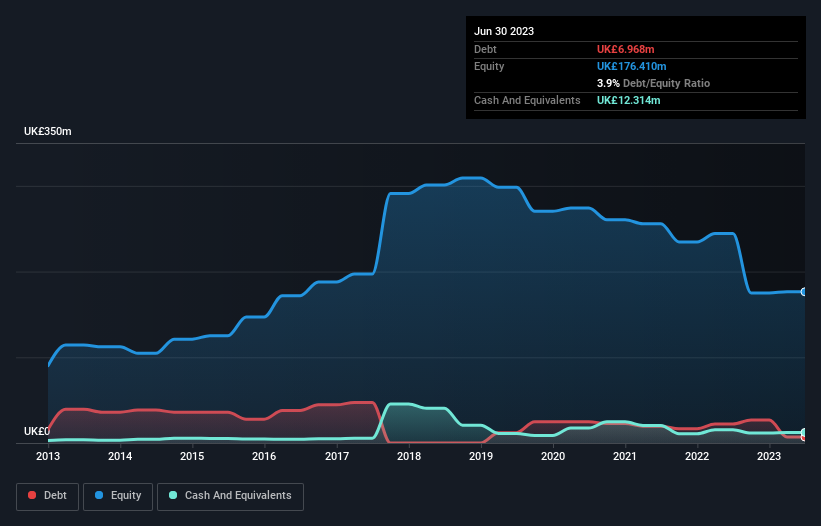Howard Marks put it nicely when he said that, rather than worrying about share price volatility, 'The possibility of permanent loss is the risk I worry about... and every practical investor I know worries about.' When we think about how risky a company is, we always like to look at its use of debt, since debt overload can lead to ruin. We can see that IQE plc (LON:IQE) does use debt in its business. But is this debt a concern to shareholders?
When Is Debt Dangerous?
Debt assists a business until the business has trouble paying it off, either with new capital or with free cash flow. Ultimately, if the company can't fulfill its legal obligations to repay debt, shareholders could walk away with nothing. While that is not too common, we often do see indebted companies permanently diluting shareholders because lenders force them to raise capital at a distressed price. Having said that, the most common situation is where a company manages its debt reasonably well - and to its own advantage. The first thing to do when considering how much debt a business uses is to look at its cash and debt together.
See our latest analysis for IQE
How Much Debt Does IQE Carry?
You can click the graphic below for the historical numbers, but it shows that IQE had UK£6.97m of debt in June 2023, down from UK£22.1m, one year before. However, it does have UK£12.3m in cash offsetting this, leading to net cash of UK£5.35m.

How Healthy Is IQE's Balance Sheet?
According to the last reported balance sheet, IQE had liabilities of UK£49.0m due within 12 months, and liabilities of UK£45.7m due beyond 12 months. Offsetting this, it had UK£12.3m in cash and UK£37.0m in receivables that were due within 12 months. So it has liabilities totalling UK£45.3m more than its cash and near-term receivables, combined.
IQE has a market capitalization of UK£134.6m, so it could very likely raise cash to ameliorate its balance sheet, if the need arose. But it's clear that we should definitely closely examine whether it can manage its debt without dilution. Despite its noteworthy liabilities, IQE boasts net cash, so it's fair to say it does not have a heavy debt load! The balance sheet is clearly the area to focus on when you are analysing debt. But ultimately the future profitability of the business will decide if IQE can strengthen its balance sheet over time. So if you want to see what the professionals think, you might find this free report on analyst profit forecasts to be interesting.
In the last year IQE had a loss before interest and tax, and actually shrunk its revenue by 17%, to UK£133m. That's not what we would hope to see.
So How Risky Is IQE?
Statistically speaking companies that lose money are riskier than those that make money. And in the last year IQE had an earnings before interest and tax (EBIT) loss, truth be told. And over the same period it saw negative free cash outflow of UK£17m and booked a UK£88m accounting loss. Given it only has net cash of UK£5.35m, the company may need to raise more capital if it doesn't reach break-even soon. Overall, we'd say the stock is a bit risky, and we're usually very cautious until we see positive free cash flow. When analysing debt levels, the balance sheet is the obvious place to start. But ultimately, every company can contain risks that exist outside of the balance sheet. We've identified 3 warning signs with IQE (at least 1 which is potentially serious) , and understanding them should be part of your investment process.
At the end of the day, it's often better to focus on companies that are free from net debt. You can access our special list of such companies (all with a track record of profit growth). It's free.
New: AI Stock Screener & Alerts
Our new AI Stock Screener scans the market every day to uncover opportunities.
• Dividend Powerhouses (3%+ Yield)
• Undervalued Small Caps with Insider Buying
• High growth Tech and AI Companies
Or build your own from over 50 metrics.
Have feedback on this article? Concerned about the content? Get in touch with us directly. Alternatively, email editorial-team (at) simplywallst.com.
This article by Simply Wall St is general in nature. We provide commentary based on historical data and analyst forecasts only using an unbiased methodology and our articles are not intended to be financial advice. It does not constitute a recommendation to buy or sell any stock, and does not take account of your objectives, or your financial situation. We aim to bring you long-term focused analysis driven by fundamental data. Note that our analysis may not factor in the latest price-sensitive company announcements or qualitative material. Simply Wall St has no position in any stocks mentioned.
About AIM:IQE
Adequate balance sheet with low risk.
Similar Companies
Market Insights
Weekly Picks

Solutions by stc: 34% Upside in Saudi's Digital Transformation Leader


The AI Infrastructure Giant Grows Into Its Valuation
Recently Updated Narratives


The "Sleeping Giant" Wakes Up – Efficiency & Monetization


The "Rate Cut" Supercycle Winner – Profitable & Accelerating


The Industrialist of the Skies – Scaling with "Automotive DNA
Popular Narratives


MicroVision will explode future revenue by 380.37% with a vision towards success


NVDA: Expanding AI Demand Will Drive Major Data Center Investments Through 2026



